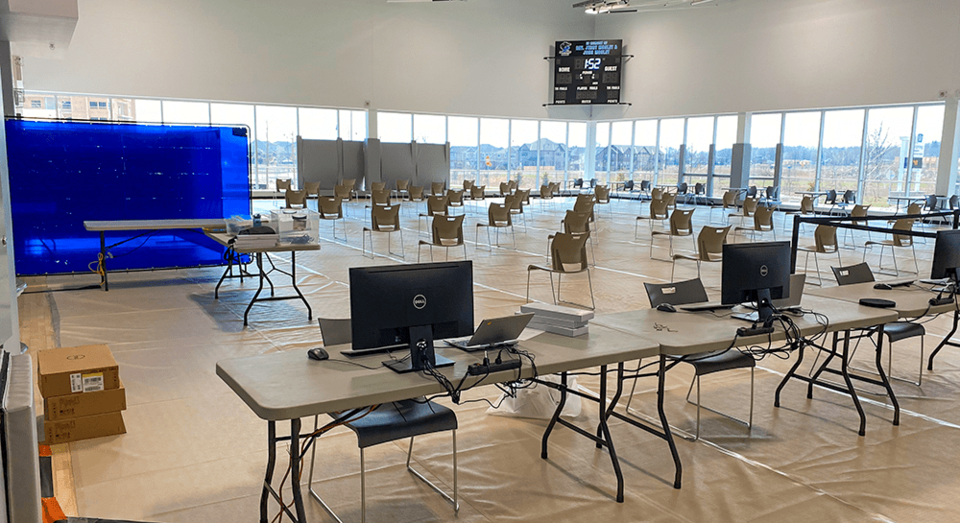Relaxed attitudes, drop in public masking see more Canadians ill in 2022 than ever before
There was a perception that we were emerging from the Covid-19 pandemic by mid 2022, and that society was returning to long-awaited normality. Infections and hospitalizations were subsiding. Restrictions related to social distancing and masking were eased, and crowds returned to restaurants, movie theatres, and ball parks.
This sense of relief was premature, says Dr. Mustafa Hirji, Niagara’s Acting Chief Medical Officer of Health. In fact, 2022 has proven the deadliest year of the pandemic yet, and there’s still another month to go.
In 2020, Covid was the official cause of death for 16,023 Canadians. In 2021, the figure dropped to 14,091. In 2022, it has jumped back up and surpassed 2020, with 16,595 deaths.
The Institute for Health Metrics and Evaluation (IHME) is estimating there are currently between 99,000 to 189,000 new infections daily, meaning that more than 1 million Canadians are currently infected with Covid. Last year at this time, IHME says there were 16,000 new infections daily.
“If you look at the number of deaths in Canada through each of the three years of the pandemic, unfortunately, 2022 ends up being the year that has had the most deaths,” says Hirji. “And of course, 2022 isn't over yet, so that number is going to continue to increase. In context, I think that we would have seen even more deaths earlier in the pandemic if we hadn't taken the strong steps we did to prevent Covid from spreading, which included a lot of sacrifice by people. This year, we're not doing that, and it's allowing the virus to spread.”
Hirji says that Covid-19 is currently the number three cause of death in Canada. It is still a significant driver of serious illness in some people, “and it's something that we shouldn't be ignoring.”
Essentially, we let our guard down too far.
“I think we were in a safer state [at the start of 2022],” he says. “Things were better, and we were able to relax some restrictions. But it also didn't mean we should revert to doing absolutely nothing. We tried to reset completely to normal, rather than scaling back [and] keeping some of the least onerous measures in place, which I would argue are things like proof of vaccination and masking.”
Hirji points to the recent deluge of reports that the healthcare system is being badly affected by the escalation of Covid-19 cases, and says that there is an urgency to ratchet up the vigilance. Early flu infections are near an all-time high. And pediatric patients are being moved to adult beds as unusually severe cases of Respiratory syncytial virus (RSV) are skyrocketing among children.
Hirji is urging the Ministry of Health to reinstate mask mandates across Ontario, although Dr. Kieran Moore, the province’s Chief Medical Officer of Health, has said unless illnesses begin to impact the backlog of surgeries or have other serious systemic repercussions, he is not ready to install a mandate.
Last week, Canada's Chief Public Health Officer, Dr. Teresa Tam, encouraged mask wearing in public.
“We are definitely into flu season now,” says Hirji, “and we're seeing other viruses spiking. Now's the time to make sure we put extra protections, like booster vaccination shots and masking, in place to make sure that winter infections don’t get any worse.”
Hirji says that everyone age 12 and older should get a flu shot. Children up to 12 should make sure they have their two Covid vaccination doses, and those five to 11 years old can get a booster dose after six months.
The fact we're talking about repeated Covid infection implies that one infection isn't giving you complete immunity
Hirji cautions against the notion that having had Covid once offers significant “natural immunity” against further infection. Vaccines are still key to protection.
“I don't want to say [having recovered from infection] doesn't heighten your immunity. But the fact we're talking about repeated Covid infection implies that one infection isn't giving you complete immunity. So it's not sufficient,” he says.
“Every time you're infected with Covid-19, there is a chance you can develop negative side effects of ‘long-Covid,’ like ongoing fatigue and brain-fog, and higher risk for diabetes and cardiovascular issues like stroke and heart attack.”
Hirji’s prescriptive advice is simple and direct.
“I can’t over-stress the importance of vaccination. Everybody should also wear masks indoors, and when they're in crowds outdoors. If you have symptoms of illness, stay home, and make sure you're not around others you might infect. Pick up some of the free rapid tests that are available at pharmacies and grocery stores, so that you can feel confident that you don't have Covid before you come out of isolation.”
The Covid-19 death toll in Niagara has reached 11 in the month of November, and Hirji said that transmission and outbreaks remain high in the Region.
According to Niagara Region statistics, as of Friday, Nov. 18, there were 831 known active Covid-19 infections, a figure that is likely a significant undercount given the prevalence of home testing. There were 15 current outbreaks, 129 patients in hospital, with under five on ventilators. Lincoln and Welland saw the highest numbers of infection per 10,000 population at 59.4 and 56.8 respectively. Pelham and Wainfleet were on the lower end of the spectrum with 32.2 and 26.7 cases per 10,000 residents.



